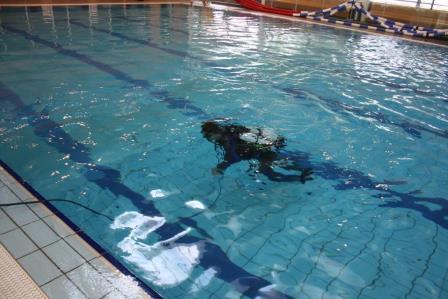Diving Training

The Authority is providing this information to assist diving contractors in ensuring that divers are competent for the method of diving being undertaken. Competence is defined as having sufficient training, experience and knowledge. It is not within the remit of the Health and Safety Authority to approve or recommend any training or qualifications, but the following information aims to provide some general guidance for industry about the minimum diving training, subject to a risk assessment, required to establish competence.
Background
The Safety, Health and Welfare at Work (Diving) Regulations 2018 and 2019, hereafter referred to as the Diving Regulations, came into force on 1 May 2019. Accompanying these Regulations were two codes of practice – the Code of Practice for Inland Diving and Inshore Diving and the Code of Practice for Offshore Diving.
Under Regulation 8(1)(a) of the Diving Regulations:
“a diving contractor shall ensure that any diver engaged in the diving operation is competent to dive in the operation, including competent in the method of diving that is safe to use in the diving operation”.
The method of diving must be determined by the written risk assessment. The diving contractor must determine what training the diver requires for the method of diving selected by the risk assessment.
Under Section 2(2)(a) of the Safety, Health and Welfare at Work Act 2005 (No. 10 of 2005):
“a person is deemed to be a competent person where, having regard to the task he or she is required to perform and taking account of the size or hazards (or both of them) of the undertaking or establishment in which he or she undertakes work, the person possesses sufficient training, experience and knowledge appropriate to the nature of the work to be undertaken".
It is important to note that having completed training does not necessarily indicate that the person is competent. Outlined below are minimum training requirements, subject to risk assessment, for diving at work in Ireland.
Minimum Diving Training Requirements (subject to risk assessment)
For diving operations carried out under the Code of Practice for Inland Diving and Inshore Diving:
- Where diving is carried out in support of construction work, surface supplied diving training is regarded within the sector as the minimum acceptable level of training. Construction work is as defined in the Safety, Health and Welfare at Work (Construction) Regulations 2013 and 2019 (S.I. No.291 of 2013 as amended by S.I No.129 of 2019). The training must be suitable for the depth to which the diving operations are being conducted.
- Recreational or sports diving training has limited application when diving for work purposes. There are certain limited circumstances where this training may be acceptable such as diving in support of:
- Helicopter Underwater Escape training (i.e. diving in a tank or pool artificially constructed for the purpose of swimming or diving, and for standby and rescue purposes in connection with helicopter underwater escape trainers);
- Scientific research work or scientific educational instruction involving simple operations such as limited duration observation work, studies of benthic conditions, basic photography, basic sampling or studying of animal or plant life in its natural habitat and the work does not involve the use of construction, lifting or specialist equipment or tools powered by anything other than a person and the diving is not deeper than 30 metres;
- Simple work in swimming pools or aquariums where the diver is in full view from the surface at all times, no entanglement or entrapment hazards are present, no specialist equipment is being used, no moving equipment or aggressive animals are present and there is no interference from other activities;
- Recreational diver training (namely the instruction and/or guidance of persons whereby the instructor/guide is at work).
In the above circumstances, training that meets EN 14153-3 Recreational Diving Services - Safety Related Minimum Requirements for the Training of Recreational Scuba Divers - Part 3: Level 3 – "Dive Leader” may be acceptable subject to the risk assessment.
For diving operations carried out under the Code of Practice for Offshore Diving:
There are currently no Irish diving training standards for offshore diving. Offshore training is approved by the Health and Safety Executive in the United Kingdom (HSE UK) for surface supplied diving up to 50 metres (HSE UK Supplied (Top Up) qualification) and for closed bell/saturation diving (HSE UK Closed Bell (Mixed Gas) qualification).
SCUBA diving training is unsuitable for diving under this code of practice (see section 8 of the code).
Recognition of Diving Qualifications
Diving qualifications do not fall under the European Union (Recognition of Professional Qualifications) Regulations 2017 (S.I. No. 8 of 2017). It is also not the Health and Safety Authority’s remit to recognise or approve diving qualifications. The diving contractor must ensure that divers are competent by ensuring that they have the appropriate training, experience and knowledge and must be in a position to prove such competency to an inspector of the Health and Safety Authority.
Two special purpose diving awards exist under the Quality and Qualifications Ireland (QQI) National Framework of Qualifications - Surface Supplied Inshore Diving (for inland and inshore diving operations up to 30 metres depth) and Commercial SCUBA Diving. These awards set the minimum standards and requirements for any organisation wishing to deliver commercial diving training in Ireland. QQI should be contacted for any queries in relation to these awards.